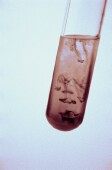Immune Response May Hinder Stem Cell Treatments
This unexpected reaction must be overcome to ensure therapeutic success, experts say.
|
E-mail this article
Subscribe to news
Printer friendly version
|

(SOURCE: Stanford University School of Medicine, news release, Aug. 18, 2008)
MONDAY, Aug. 18 (HealthDay News) -- Human embryonic stem cells trigger an immune response in mice, a new study finds. If the same thing happens in humans, it could prove a big roadblock to stem cell-based treatments, researchers say.
Researchers at Stanford University School of Medicine found that common anti-rejection medications could counter the mice's immune response. However, the new finding dashes prior hopes that the immune system gave foreign embryonic stem cells a "free pass" through the body.
"It's getting harder and harder to believe that these cells are immunoprivileged," senior author Dr. Joseph Wu, assistant professor of cardiovascular medicine and of radiology at Stanford, said in a news release issued by the university. "In fact, the rejection of these cells confirms our suspicions that they do cause an immune response."
The findings were to be published in the Aug.18 online edition of the journal Proceedings of the National Academy of Sciences.
Embryonic stem cells form all cells in an embryo. Many researchers have suggested that the immune system ignores them to allow the growth of a fetus that contains both maternal and paternal genetic material. Such an immunological exemption would counter concerns about using cells therapeutically that don't exactly match the recipient's immune system.
After injecting human embryonic stem cells into mice, those cells died within 10 days in mice with good immune systems but survived and multiplied in the mice with impaired immune responses. Further injections into the normally functioning mice led to more rapid cell death, a sign that the mice's immune system was getting better at recognizing and rejecting the cells.
"The data is quite convincing," Wu said. "Based on these results, we believe that transplanting these cells into humans would also cause an immune response."
Medicating the mice with normal immune systems with a combination of two common anti-rejection compounds -- tacrolimus and sirolimus -- allowed those cells to survive for up to 28 days, the team said.
More information
The U.S. National Institutes of Health has more about stem cells.
Copyright © 2008 ScoutNews, LLC. All rights reserved. 
HealthDayNews articles are derived from various sources and do not reflect federal policy. healthfinder.gov does not endorse opinions, products, or services that may appear in news stories. For more information on health topics in the news, visit the healthfinder.gov health library.